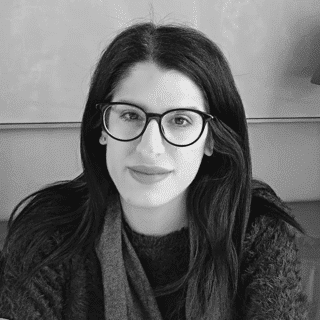
Chrystala Psathiti
Lecturer in Architectural Design/ Theory
The new, innovative and multidisciplinary distance postgraduate programme Space and Brand Identity at Neapolis University Pafos combines the fields of Architecture-Space, Business Administration (MΒΑ) and Marketing.
More specifically, the postgraduate program Space and Brand Identity it is a unique program that deals with space branding and the way architecture can be a communication device used in order to achieve an experiential marketing and convey brand values and ideas.
The curriculum combines courses from Architecture, from the postgraduate programme in Business Administration (MBA) and Marketing. This programme’s structure enables students from the creative disciplines to understand the business world, to familiarise themselves with innovation and entrepreneurship as well as with digital marketing techniques so as to promote their unique personal brand through the physical and digital space. Also, the emphasise that is given in understanding, analysing and evaluation of branded spaces (i.e retail spaces etc) gives to our graduates from the creative disciplines a unique specialisation for the design of similar spaces.
At the same time, it enables students from the business world to appreciate the role and power of space as marketing device for the promotion of brand identity (experiential marketing) and thus to improve their decision making. The multidisciplinary orientation of the program aims to give to our graduates a unique competitive advantage, since graduates can learn techniques to promote their unique personal brand, to be specialised on retail spaces design, or to simply use their store/office space as a live embodiment of their brand.
More specifically, the MSc Space and Brand Identity aims, by combining both theoretical knowledge and practical approaches, to:
The MSc in European Politics and Governance Programme is offered in the English/Greek language.
1.5 academic year (3 academic semesters, 90 ECTS)
The program primarily targets graduates of Architecture, Interior Design, Finance, Accounting, Economics and Business programmes. In particular it is suitable for:
The programme learning outcomes are the following:
The Programme’s teaching methodology involves a combination of lectures, tutorials, seminars, examinations, projects, presentations, assignments, case-study applications and independent research. In addition, it is designed to provide an academic experience going beyond that of the traditional classroom, in which the flow of information is primarily from the instructor to the student. The intention of the Programme is that each participant will contribute to the education of the entire class though active participation in the learning procedure. This will establish the understanding that an MSc in Space and Brand Identity a holistic and interdisciplinary approach.
Each course is evaluated through the completion of one midterm assessment which is explicitly mentioned in the study curriculum and the study guides (essays, literature critiques, article manuscript for the university’s student journal etc.) during the semester, and final examinations at the end of the semester. Should a student not attend the examination, or has failed to take a winter or spring semester examination, he or she is entitled to re-sit the examination.
Midterm assessment can take various forms as described earlier like essays, research articles, presentations, literature critiques, book reviews etc, during the semester and corresponds corresponds to 40% of the final grade, while the final exam is 60%. For the student to succeed in a course, he / she must take both on the final grade and the midterm assessment a grade of at least 50%. The interactivity and formative assessment form part of the learning and teaching methodology.
In the third semester students complete their Dissertation which corresponds to 30 ECTS. The length of the thesis depends on the type. In the case of a bibliographic thesis, it cannot be less than 12,000 words and more than 15,000 words. The bibliography, the annexes and the abstract are not included. After submission, the supervisor submits a written and reasoned report, with the student’s consent, to the members of the committee. Support for the thesis is done publicly or via an electronic videoconference before a three-member committee.
| Code | Course title | Course type | ECTS |
|---|---|---|---|
| DSBI501 | Introduction to issues on Architecture, Space and Identity | Compulsory | 7.5 |
| DSBI502 | Architecture as Communication Device: ‘The Medium is the message’ | Compulsory | 7.5 |
| DMBA584 | Entrepreneurship and Innovation | Compulsory | 7.5 |
| DIS509 | Research Methods | Compulsory | 7.5 |
| Code | Course title | Course type | ECTS |
|---|---|---|---|
| DSBI503 | Holistic Approach to Branded Spaces | Compulsory | 7.5 |
| DSBI504 | Architecture & Human Behaviour | Compulsory | 7.5 |
| DMBA561 | Marketing Management & Business Communication | Compulsory | 7.5 |
| DMBA580 | Leadership & Organizational Behaviour | Elective | 7.5 |
| DM505 | Digital Communication and Social Media Strategies | Elective | 7.5 |
| Code | Course title | Course type | ECTS |
|---|---|---|---|
| DSBI510 | Dissertation | Compulsory | 30 |
The necessary supporting documents to be submitted with the application include:
The University reserves its right to define the electives offered on an academic year basis.
The programme structure may change without prior notice, as a result of quality assurance procedures or/and programme recertification.
Register your interest and one of our admissions consultants will contact you with guidance and additional information.